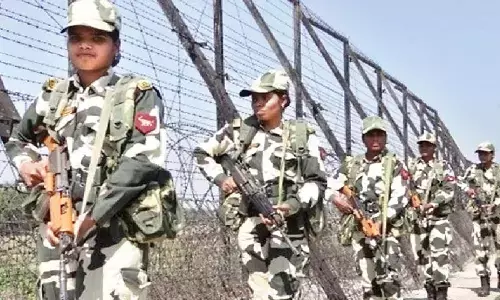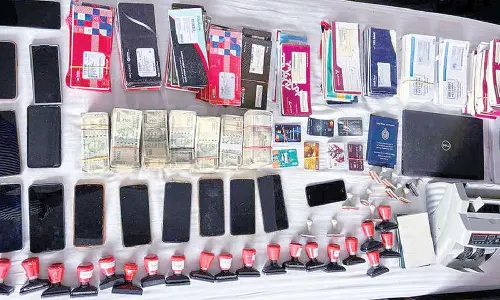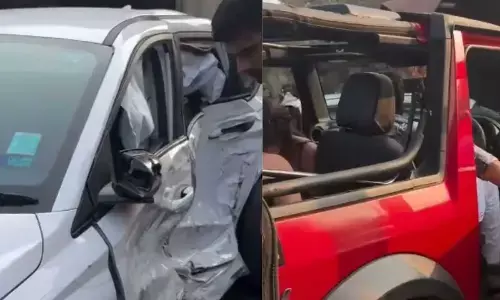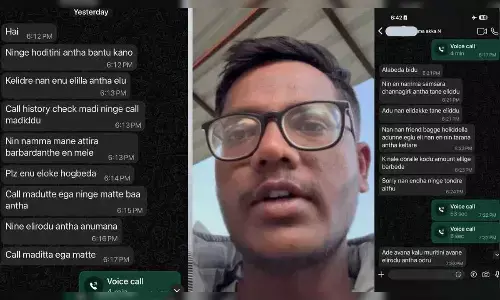Secret tunnels, irregularities galore detected at Dera headquarters

No proper record of dead bodies being sent from the hospital running inside the Dera Sacha Sauda headquarters was maintained while a skin bank was running without license, a senior official said as the mammoth \"sanitisation\" exercise of the complex was completed on Sunday.
NEW DELHI: SIRSA: No proper record of dead bodies being sent from the hospital running inside the Dera Sacha Sauda headquarters was maintained while a skin bank was running without license, a senior official said as the mammoth "sanitisation" exercise of the complex was completed on Sunday.
Secret tunnels, including one which linked jailed sect chief Gurmeet Ram Rahim Singh's plush residence with female disciples' hostel, an empty box of AK-47 cartridges, an illegal firecracker factory were among other shocking detections made, according to Haryana's Public Relations Department Deputy Director, Satish Mehra.
Irregularities in the implementation of the Medical Termination of Pregnancy (MTP) Act by the Dera were also detected, he said.
The sanitisation exercise, which involved various government agencies, ended on Sunday and will bring to the locals as the mobile internet as well as train services, which had been suspended, will resume from tomorrow, he said.
However, curfew will remain in force near Dera Sacha Sauda complex, he said adding that relaxation will be given to the residents to buy daily necessities.
Security agencies and government departments had launched a coordinated effort as part of this exercise which was overseen by a court commissioner.
The sanitisation exercise was conducted two weeks after Dera chief Gurmeet Ram Rahim Singh was convicted and jailed by a special CBI court for raping two disciples.
There was large scale violence following the sect head's conviction which left 35 people dead in Panchkula alone. Violence broke out in Sirsa, where six died, and many parts of Punjab as well.
"The search operation process in the Dera was launched on September 8 and was overseen by Court Commissioner AKS Pawar. The search operation continued till today and the process is complete now," Mehra told reporters Sunday evening.
He said the process remained smooth and peaceful.
Giving details, Mehra said that a health department team searched a hospital running inside the Dera and sealed a skin bank which was allegedly "running without licence".
"Also, it was found that no record of the dead bodies being sent out of the hospital had been maintained," Mehra said.
He also said that a health department team detected irregularities in the implementation of the Medical Termination of Pregnancy (MTP) Act by the Dera.
Besides, an illegal wood cutting machine was sealed and some 'lathis' were also found, he said.
The sanitisation process led to unearthing of two secret tunnels, including one that connected the Dera Sacha Sauda chief's residence with the hostel for female disciples, and an illegal firecracker factory.
An empty box of AK 47 cartridges, 84 cartons of fire crackers and chemicals from the illegal factory, besides hundreds of pairs of shoes, designer clothing and caps, were also found, Mehra said.
The other fibre glass tunnel detected by the security forces opened some five kilometre away from the Dera head's private residence.
Computer hard disk drives, an unregistered Lexus car, an OB van, Rs 7,000 of demonetised currency, Rs 12,000 cash and some pharma medicines without labels or a brand name, a walkie-talkie set were also seized, the official said.
Mehra said forensic teams were also involved in the sanitisation exercise.
During the sanitisation operation inside the Dera, the authorities also found five boys, two of them minor, from Upkar Colony, where some Dera followers permanently reside, he said.
"The search operation process is 100 per cent complete now. Officials in charge of various sectors made for the purpose of search have submitted their report to the Court Commissioner AKS Pawar who has to submit the report to the Punjab and Haryana High Court, Mehra said.
The Dera's sprawling headquarters include a township of its own, with schools, a sports village, a hospital, a shopping mall and a cinema hall. The property is also home to an ostentatious '7-star MSG resort' with replicas of Eiffel Tower, Taj Mahal, Kremlin and Disney World inside.
Police, paramilitary and civil administration personnel were involved in the mammoth operation which started on Friday on the direction of Punjab and Haryana High Court.
The entire sanitisation process was videographed.
The Army Major speaks about the stunning mission in a new book being brought out on the first anniversary of surgical strikes in Pakistan occupied Kashmir.
The officer is referred to as Major Mike Tango in the book, titled "India's Most Fearless: True Stories of Modern Military Heroes".
The Army had decided to use soldiers from the units that had suffered losses in the Uri attack for the elaborate revenge mission.
A Ghatak platoon was formed and soldiers from the two units that had lost men were roped in to man border posts and provide crucial terrain intelligence and support to the mission that lay ahead.
"Tactically, this was a smart move - few knew the lay of the frontier land better than they did. But there was another astute reason."
"Involving them in the mission would at least begin to lay the ghosts of Uri to rest," says the book.
About the details of the planning, it says, "The target list was scrutinised along a top-secret chain of command that numbered barely a handful of people, with 'need to know' rules applicable throughout."
"The options were vetted by designated officers from the Intelligence Bureau and the Research and Analysis Wing, before a final recommended brief was presented to the government."
Major Tango was entrusted with the job of leading the operation to carry out the strikes.
"As team Leader, Major Tango had chosen every man himself, including the officers and men who would play a supporting role. He was also acutely aware of the fact that the lives of 19 men were, quite literally, in his hands," the book says.
Though Major Tango chose the best men for the job, one thing was bothering him - the de-induction or the return.
"That's where I knew I could lose guys," the book quotes him as recalling.
"Even the actual attack was not something that flustered the commandos. It was the return, an uphill trek to the LoC that was the truly daunting part."
"Their backs would be facing a blaze of fire from Pakistan Army posts, belatedly roused from their slumber. And the dominant position held by the posts would make the escaping warriors easy targets to spot and kill," the book says.
A total of four terror launch pads operated by Pakistan's Inter-Services Intelligence (ISI) and protected by the Pakistan Army were selected.
"Through a series of masked communications over mobile, Major Tango's men contacted four 'assets'- two local villagers in PoK and two Pakistani nationals operating in the area - both moles in the dreaded Jaish-e-Mohammed terror group, men who had been turned by Indian agencies a few years before.
"All the four assets separately confirmed the target information that was placed before them. In terms of intelligence, there was nothing further for the team to do on this side of the LoC," the book says.
The book, written by Shiv Aroor and Rahul Singh and published by Penguin India, tells 14 true stories of extraordinary courage and fearlessness, providing a glimpse into the kind of heroism India's soldiers display in unthinkably hostile conditions and under grave provocation.
The mission was brief - the soldiers were expected to reach their targets, study the latest intelligence they could possibly access with their satellite devices and then proceed to wipe out every man they saw there, the book says.
The weapons and equipment were then finalised.
"Major Tango would be armed with his M4A1 5.56-mm carbine, the rest of the assault team with a mix of M4A1s and standard-issue Israeli Tavor TAR-21 assault rifles, Instalaza C90 disposable grenade launchers and Galil sniper rifles. Batteries on night-vision equipment were checked and other devices were charged too," the book says.
Two of the terror launch pads identified as targets for Major Tango's team were well inside PoK and roughly 500 metres away from each other, it says.
"Each launch pad is really a transit staging area for terrorist infiltrators before they are sent across the LoC. Both launch pads were close to Pakistan Army posts for logistical and administrative purposes. ISI handlers would often visit these launch pads before infiltration attempts," according the book.
"From the moment the firefight began until the last bullet was fired, it had been just over an hour. The frenetic pace of the assault meant the teams, now united after the split attack on two launch pads, would prepare to leave with only a very rough estimate of the number of terrorists they had managed to kill: 20. The figure would be corroborated days later by India's external intelligence.
"A total of 38-40 terrorists and two Pakistan Army personnel were killed at the four targets. The three separate teams had simultaneously struck 4 launch pads across the LoC. Their entry into PoK had been coordinated and precisely timed," it says.
As for the return, the major decided to take not the route used to enter PoK but a different path that was longer and more circuitous, but comparatively safe.
But while the Indian soldiers were returning, the Pakistan Army posts opened fire with everything they had - enraged by the cross-border strike.
"At one point, the bullets were so close, they were whistling past our ears. There's a familiar put-put sound when rounds fly very close to your head," Maj. Tango recalls.
"If I were a foot taller, I would have been hit many times over."
During the circuitous escape, the men were frequently flat on the ground as trees in their path were shredded to bits by hails of ammunition, the book says.
"A particularly vulnerable 60-metre patch in the de- induction route gave the commandos their closest call. Still flat on their bellies, but with no natural feature hiding them, they needed to slither the full distance without being hit. Crossing in pairs as ammunition hit the ground inches from them, Maj. Tango's team made it to the LoC before the sun was up, finally crossing it at 0430 hours."
The Dera headquarters, spread over nearly 800 acres, was divided into ten zones for the purpose of sanitisation and searches, with each zone under the control of a senior officer.
The Dera chief, who featured in a few films directed and co-produced by himself, also has some shops in the complex where consumer products launched two years ago under "MSG" brand were sold.
Quick Reaction Team vehicles, heavy earth moving machines, bomb disposal squad, anti-sabotage team vehicles, dog squads, tractor trollies and fire tenders were pressed into service in the mammoth exercise.
The Dera management had said it would cooperate with the authorities.









